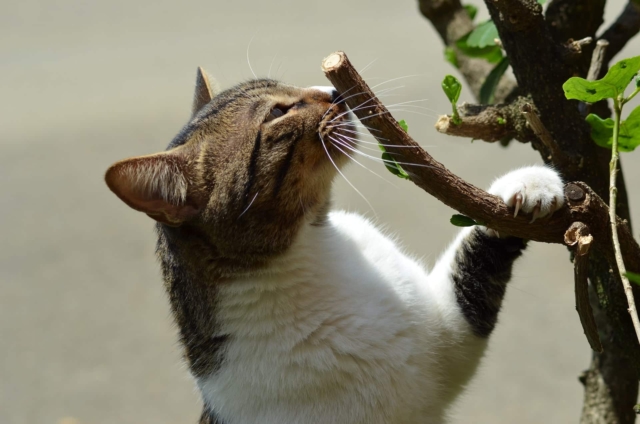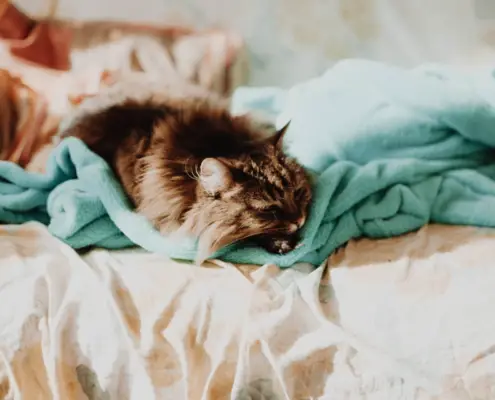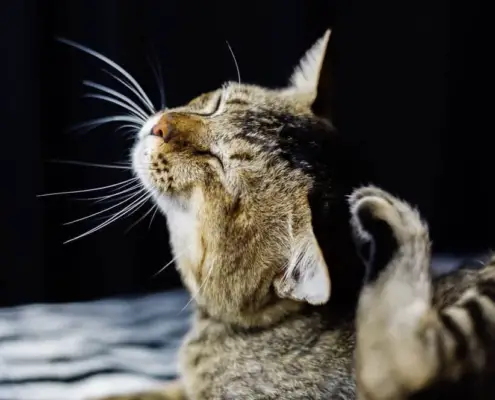
Cats have long been renowned for their exceptional sense of smell. With approximately 200 million scent receptors in their noses, compared to a human’s mere 5 million, cats possess an olfactory system that is truly extraordinary. This heightened sense of smell allows them to detect scents at levels far beyond our comprehension. But can cats go beyond detecting everyday scents? Can they actually detect cancer in humans?
Understanding the science behind cats’ sense of smell
To appreciate the remarkable abilities of cats’ sense of smell, it is important to understand the science behind it. The olfactory system in cats is designed to detect and process a wide range of scents. Their noses contain specialized cells called olfactory receptor neurons, which capture odor molecules from the environment. These molecules bind to specific receptors and send signals to the brain, where they are interpreted as different scents.
But what sets cats apart is their vomeronasal organ, also known as the Jacobson’s organ. This organ, located in the roof of the mouth, allows cats to detect pheromones – chemical substances that carry important information about other animals. It is this combination of a highly developed olfactory system and the vomeronasal organ that gives cats their exceptional sense of smell.
Can cats really detect cancer in humans?
While it may seem like something out of a sci-fi movie, there is growing evidence to suggest that cats can indeed detect cancer in humans. Numerous anecdotal stories have emerged, detailing instances where cats have exhibited unusual behavior towards their owners, prompting them to seek medical attention. These stories, coupled with scientific research, have raised intriguing questions about the potential role of cats in cancer detection.
Research and studies on cats’ ability to detect cancer
Several studies have been conducted to explore cats’ ability to detect cancer. One notable study, published in the journal “Applied Animal Behaviour Science,” found that trained cats were able to distinguish between urine samples from healthy individuals and those with bladder cancer. The cats consistently showed a preference for the cancerous samples, suggesting that they were able to detect the presence of cancer-specific compounds.
In another study, researchers at the University of California, Davis, trained five cats to detect lung cancer in human breath samples. The cats were able to correctly identify the cancer samples with an impressive accuracy rate of 93%. These findings provide compelling evidence that cats possess a remarkable ability to detect cancer-related odors.
How do cats detect cancer? Exploring the possible mechanisms
The exact mechanisms by which cats detect cancer are still not fully understood. However, there are several theories that attempt to explain this phenomenon. One possibility is that cancer cells produce volatile organic compounds (VOCs) that cats can detect. These VOCs may have distinct odors that cats are sensitive to, allowing them to differentiate between healthy and cancerous samples.
Another theory suggests that cats may be detecting changes in the body odor of individuals with cancer. It is known that cancer can alter a person’s metabolic processes, leading to changes in the composition of their body odor. Cats, with their highly sensitive noses, may be able to pick up on these subtle changes and alert their owners to the presence of cancer.
Real-life stories of cats detecting cancer in their owners
There are numerous real-life stories of cats detecting cancer in their owners, further highlighting their incredible abilities. One such story involves a woman named Nancy, whose cat, Smokey, repeatedly pawed at her right breast. Concerned by this behavior, Nancy went to the doctor and was diagnosed with early-stage breast cancer. Smokey’s unusual behavior had alerted her to a potentially life-threatening condition.
Another remarkable story is that of a man named Paul, whose cat, Oscar, would curl up next to him and refuse to leave his side. Concerned by the cat’s persistent behavior, Paul went for a medical check-up and was diagnosed with colon cancer. Oscar’s unwavering attention had led to the early detection of a serious illness, potentially saving Paul’s life.
The potential implications of cats’ cancer-detection abilities in healthcare
The ability of cats to detect cancer has significant implications for healthcare. Early detection is crucial in effectively treating cancer, and if cats can aid in this process, it could potentially save countless lives. Cats could be used as a complementary screening tool, alerting individuals to the presence of cancer before symptoms even manifest. This could lead to earlier diagnosis, more successful treatment outcomes, and a higher survival rate for cancer patients.
Other animals with extraordinary smelling abilities
While cats may be the most famous for their exceptional smelling abilities, they are not the only animals with this talent. Dogs, for example, have been extensively trained to detect various types of cancer, including prostate, lung, and breast cancer. Their accuracy rates in detecting cancer-specific odors have been impressive, and they are even being employed in some hospitals as cancer-detection dogs.
Bees, too, have been shown to possess an incredible sense of smell. Researchers have trained honeybees to detect ovarian cancer by associating the scent of the cancerous tissue with a sugary reward. The bees were able to generalize their learning and correctly identify ovarian cancer samples with an accuracy rate of 98%. This demonstrates the potential for using bees as bio-sensors in cancer detection.
The future of cancer detection: Can cats be trained for medical purposes?
Given the growing body of evidence supporting cats’ ability to detect cancer, it is worth exploring whether they can be trained for medical purposes. While dogs have been successfully trained as cancer-detection animals, the training process for cats may prove to be more challenging. Cats are known for their independent nature, making them less amenable to rigorous training.
However, with further research and advancements in animal training techniques, it may be possible to harness the incredible abilities of cats for medical purposes. Imagine a future where cats are trained to detect cancer in a non-invasive, cost-effective manner, providing an additional layer of screening for early detection. This could revolutionize cancer diagnosis and potentially save countless lives.
The remarkable world of cats’ sense of smell and its potential in cancer detection
The extraordinary sense of smell possessed by cats is a marvel of nature. Their ability to detect scents at levels far beyond our comprehension has captivated scientists and pet owners alike. While the exact mechanisms by which cats detect cancer are still not fully understood, there is growing evidence to suggest that they can indeed sniff out this deadly disease.
Real-life stories, coupled with scientific research, highlight the potential of cats in cancer detection. Their remarkable abilities could serve as a valuable complementary tool in early diagnosis, leading to more successful treatment outcomes and higher survival rates. The future holds exciting possibilities for harnessing the extraordinary sense of smell in cats for medical purposes, paving the way for a new era in cancer detection.
If you or someone you know has a cat exhibiting unusual behavior, don’t dismiss it. Consult a healthcare professional to rule out any potential health concerns. Early detection is key in the fight against cancer, and our feline friends may just have the nose for it.
If you enjoyed my article, I would appreciate you sharing it with your network.

Sima Ndlebe
Sima writes for CatBuzz. He is interested in Cats, Health and Fitness, and Entrepreneurship.
Published: 31 October 2023
Related Articles
Disclaimer
The content found on CatBuzz.org is presented on an "as is" basis and is intended for general consumer information and education purposes only. Any utilization of this information is voluntary and solely at the user's own risk.
None of the articles or content should be regarded as, or used in place of, veterinary medical advice, diagnosis, or treatment. The information provided on the website is purely for educational and informational intentions and should not be considered a substitute for professional guidance from a veterinarian or other qualified expert. The articles are designed to inform consumers about veterinary healthcare and medical matters that may impact their cat's daily life. It should be noted that this website and its services do not constitute the practice of any form of veterinary medical advice, diagnosis, or treatment. CatBuzz.org explicitly disclaims any liability for any direct or indirect damages or losses that may arise from the use of or reliance on the information contained within the content.
Consumers must consult a veterinarian, veterinary specialist, or another qualified veterinary healthcare provider when seeking advice regarding their cat's health or medical conditions. It is important not to ignore, avoid, or postpone seeking medical advice from a veterinarian or other qualified veterinary healthcare provider solely based on information obtained from this website. If you believe that your cat may be experiencing a medical issue or condition, it is imperative to promptly contact a qualified veterinary healthcare professional.



